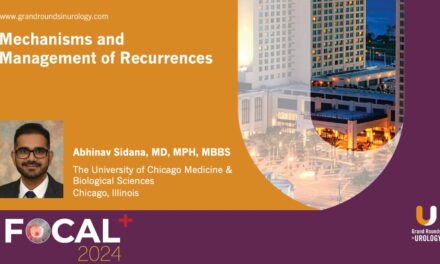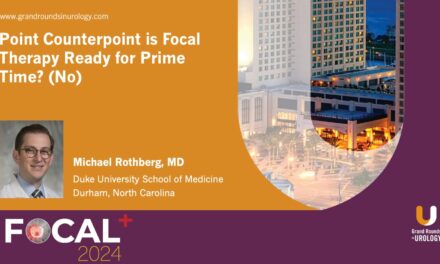Nelson N. Stone, MD, presented “Does the Radiation Dose Required to Eradicate Local Disease Differ by Gleason Grade Group?” during the Southwest Prostate Cancer Symposium 2020 virtual conference in December 2020.
How to cite: Stone, Nelson N. “Does the Radiation Dose Required to Eradicate Local Disease Differ by Gleason Grade Group?” December 2020. Accessed Nov 2025. https://grandroundsinurology.com/does-the-radiation-dose-required-to-eradicate-local-disease-differ-by-gleason-grade-group/
Does the Radiation Dose Required to Eradicate Local Disease Differ by Gleason Grade Group? – Summary
Nelson N. Stone, MD, Professor of Urology, Radiation Oncology, and Oncological Sciences at the Icahn School of Medicine at Mount Sinai and at the Derald H. Ruttenberg Cancer Center at Mount Sinai, discusses the radiation dose requirements for local disease eradication and the implications for focal therapy. He presents studies of external vema radiation and brachytherapy, which both showed that as the radiation dose increased the likelihood of a positive biopsy decreased two years post treatment. Dr. Stone concludes that it does not matter what type of disease the patient has, it matters how much radiation is used to get rid of the disease. Longer term follow up is needed to see the impact of radiation doses. Post-irradiation biopsies imply that a BED of over 240 Gy can eradicate all prostate cancer. If a tumor is small then there is a potential for a high dose of radiation just to the affected regions. Larger tumors or cases with extensive multifocality will require a full dose treatment with a full or partial implant.
About the Southwest Prostate Cancer Symposium 2020 virtual conference:
Presented by Program Chairs Nelson N. Stone, MD, and Richard G. Stock, MD, this virtual conference educated attendees about advances in the management of localized and advanced prostate cancer, with a focus on imaging, technology, and training in the related devices. It included a scientific session, as well as live demonstrations of surgical techniques. You can learn more about the conference, including the 2021 iteration, here.
ABOUT THE AUTHOR
Nelson N. Stone, MD, is Professor of Urology, Radiation Oncology, and Oncological Sciences at the Icahn School of Medicine at Mount Sinai and chief medical officer at Viomerse, Inc.
Dr. Stone earned his medical degree from the University of Maryland in 1979. He completed a Residency in General Surgery in 1981 at the University of Maryland, followed by a Residency in Urology at the University of Maryland. He then completed a Fellowship in Urologic Oncology at Memorial Sloan-Kettering Cancer Center and a Research Fellowship in Biochemical Endocrinology at Rockefeller University in 1986. He was Chief of Urology at Elmhurst Hospital Queens from 1986-1996.
Dr. Stone has founded several medical companies and serves on the editorial board of many scientific journals. He is a member of many professional societies, including the Prostate Conditions Education Council, the Society for Minimally Invasive Therapy, the New York State Urological Society, the American Association of Clinical Urologists, and the American Urologic Association. Dr. Stone has participated in approximately 25 research studies on prostate cancer and has authored more than 500 articles, abstracts, and book chapters, primarily on prostate cancer. He invented the real-time technique for prostate brachytherapy in 1990 and has trained more than 5,000 physicians worldwide through his company ProSeed. His most recent company, Viomerse, creates synthetic body parts (phantoms) for surgical training and has recently released an extended reality remote training platform.



